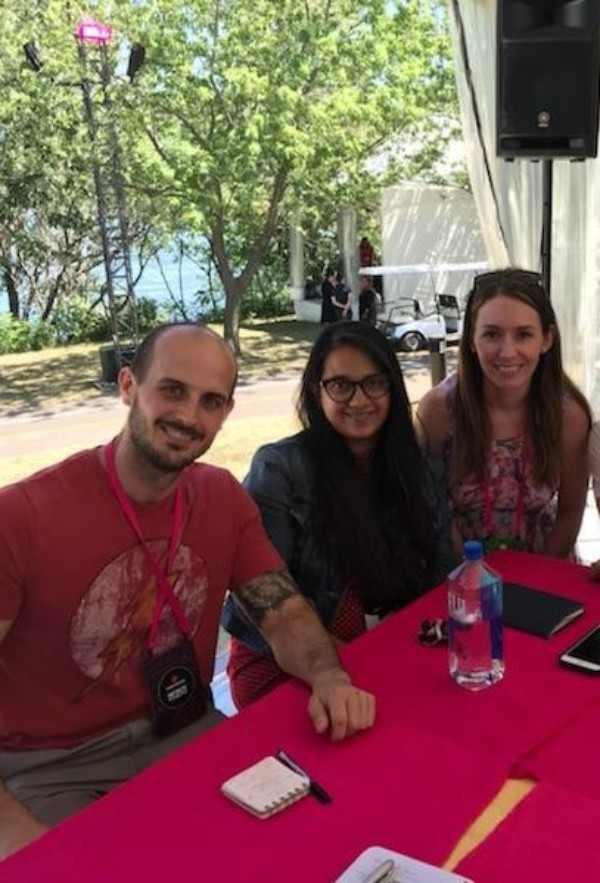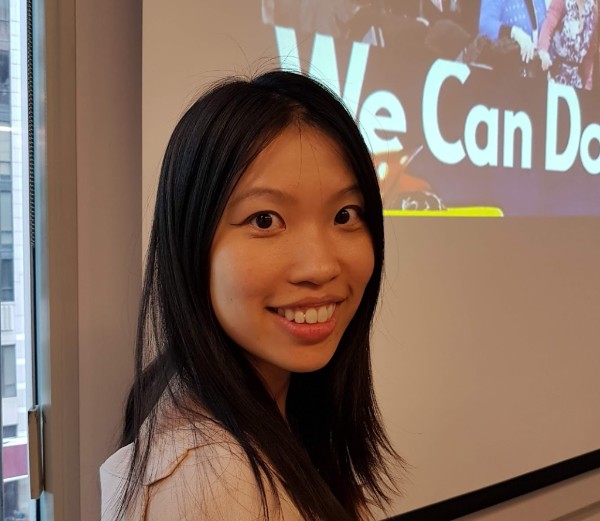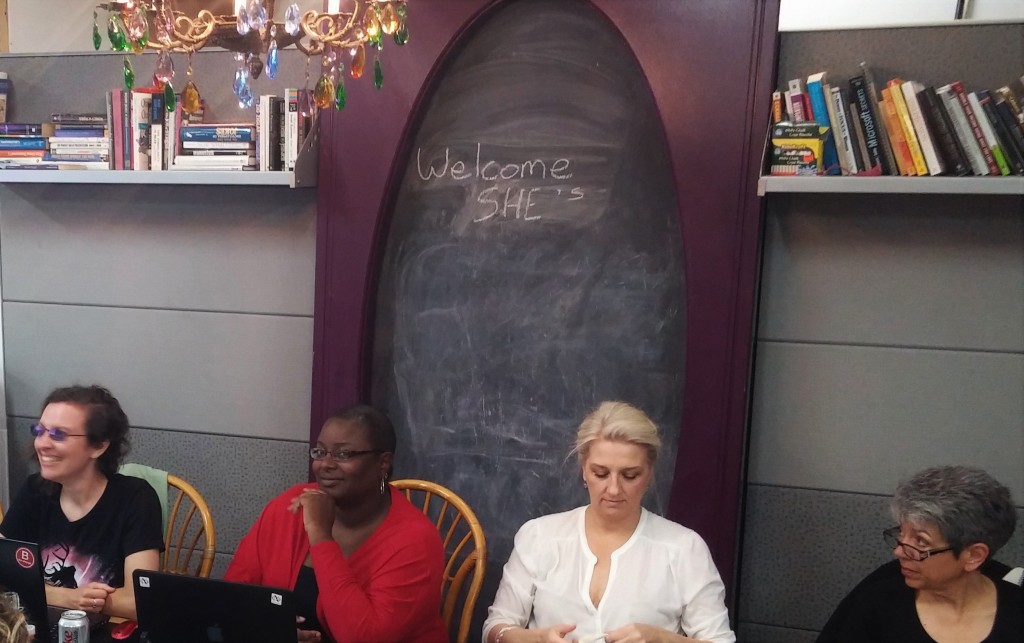The post LIISBETH DISPATCH #44 appeared first on LiisBeth.
]]>
VIEWPOINT
STARTUP INCUBATORS ARE FAILING WOMEN ENTREPRENEURS-SO LET’S FIX IT.
In my line of work as a program consultant, I am often hired to help startup incubators and innovation spaces rethink how they attract and more importantly, retain more women entrepreneurs; In Canada at least, their public funding support is increasingly dependent on doing so.
Turns out, marketing only to women, tossing in a few pink bean bag chairs, and offering free tampons and perfumes in newly labelled gender-neutral washrooms doesn’t cut it. Neither does creating women-only startup programs embedded in co-ed spaces with programs that reinforces the patriarchal status quo. They sound good at first, but soon after the program starts, women entrepreneurs end up feeling ghettoized and stigmatized.
They end up frustrated. They leave. And they don’t come back.
Today, only 16% of incorporated enterprises in Canada are women-led and women majority owned. Reports show that participation in co-ed incubator spaces runs between 5 and 30% on average. Yet women start businesses at a rate of 20-30% higher than men. Studies showed that in spite of the extra baggage, women-majority owned businesses out-perform their male counterparts on several metrics.The fact is, ineffective programs for female founders is costing Canada alone billions of dollars of lost economic opportunity.
What economy can afford that?
Many people leading co-ed entrepreneurship and innovation incubators acknowledge the still growing body of research that confirms again and again that women face additional barriers as entrepreneurs thanks to gender-bias in our financial systems, sexism, and the realities of biology in an economy designed to privilege people who can delegate caregiving and don’t need time off after physically growing and finally squeezing a new eight to ten pound human out of their bodies–not to mention then feeding them exclusively via your boobs for months after.
In fact, the people running incubators witness examples of the many barriers first hand. They have VIP seats in the stadium when it comes to observing how women experience and must navigate entrepreneurship differently to succeed. They also see how women of colour, indigenous women, newcomers, and those working two jobs to make ends meet. They experience additional challenges.
So why are they having so much trouble figuring out how to help women founders, and their enterprises, flourish?
The answer is in knowing “how to get through a gateless gate“.
This article could help get you started.
THIS WEEK ON LIISBETH

Woman Is Wolf to Woman
From a psychological and philosophical perspective, mental health counsellor, Maria Basualdo discusses the critical need for women to unite and work together. “…activism is the only way women can bring about transformation in ourselves, not just socially and politically, but by refusing to be wolf to women in our mundane realities.”
Sounds like an obvious idea. But why doesn’t it happen?

Montreal Startup Fest 2018
New Contributor Ria Lupton got an “inclusion” ticket to Startupfest 2018 in Montreal last month. So we asked her to writing a story about her experience as a participant in a program dedicated to “…connecting entrepreneurs from diverse communities to equal opportunities.”
Ultimately, we wanted to know if to find out if things had improved since we last wrote about this tech-fest now in its seventh year.
Fallen Men of Thrones
I knew that billionaire motivational speaker Tony Robbins and I were not aligned in many of our beliefs about how the world worked. But he sure knew how to whip up mass hysteria.
In the video above, you will notice that his euphoric fans represent a diverse, mostly-male-but-good-helping-of-female crowd looking to be primarily…reassured. They are told that if they work hard, remain disciplined, clean, goal-focused, and believe in themselves, the world is theirs to exploit—despite the various systemic oppressions they face. Blaming something other than yourself for your state in life is not part of Robbins’ creed. “Just Say Yes! And presto, you are halfway there!”
Come on. Who doesn’t love a message like that?
But then came Robbins’ #metoo moment where he showed incredible ignorance about the powers that shape the lives of women in the workplace. He apologized. But that wasn’t enough for Kelly Diels.

This is Diels, a feminist marketing expert, who is writing a new book about the female empowerment brand says “…when our most cherished self-help leaders, spiritual teachers, coaches and empowers-of-women are waving the same flag as an MRA, let us agree it is a red one.”
In her free-online-chapter of her upcoming book, Diels critically interrogates the female empowerment brand and highlights the dark role that motivational speakers—mostly male but also many female—play in advancing this dangerous opioid-like narrative.
If you are attending a conference with a motivational speaker as a keynote in the next few weeks, you might want to read this before you go.
LIISBETH FIELD NOTES

Don’t You Want Me
A global photography project showcasing the beauty and resilience of disenfranchised LGBTQ people with their rescued dogs. The coupling of compelling and personal images with accompanying narratives and a celebratory flair, the aim is to show that individuals of all stripes have the shared ability to transform their lives when they are given love and the question of ‘who rescued who’ becomes universal, no matter how you identify.
The project kicks off soon and is currently seeking subjects in Toronto, Brighton UK, and NYC. To participate get in touch here.
Feminist Economics Yoga in Thunder Bay
Cassie Thornton isn’t a healer, she’s just really angry. She is also an artist, an activist, and a kundalini yoga instructor who lives and works between Thunder Bay, Berlin, and Oakland.
In short, Feminist Economics Yoga is combining feminized practices and values like care, health and reproduction with a challenging but accessible yoga practice that focuses on breath and movement. It is designed to heal the nervous system, spine and brain—all areas affected by the experience and challenges of living, breathing, and working in today’s world.
“Practicing feminist economics yoga is a way to remind yourself to check in with what you’re experiencing and see what parts you might want to break up with.” – Cassie Thornton, Feminist Economist
You can help fund production of a new series of yoga video tutorials that aim to help heal our social and economic wounds and move forward collectively by visiting Cassie’s Kickstarter campaign: Let’s Break Up w/ Capitalism!
She is planning a Feminist Economics Yoga workshop is in Thunder Bay later this fall. For more info go to: www.secretchakra.net

Is the Backlash back?
From the Aspen Ideas Festival…Good Feminist, Bad Feminist — Who Gets to Decide?
“The beauty of feminism is that it’s always growing and changing and that we allow space for it.” – Tarana Burke, Founder of #Metoo Movement
If you have an hour on your hands, take the time to watch this panel talk. It will change your perspective. The star of the show in our view was Brittney Cooper, Associate Professor of Women’s and Gender Studies and Africana studies at Rutgers University. She is also the co-founder of the edgy and widely read Crunk Feminist Collective blog. Her new book, Eloquent Rage: A Black Feminist Discovers Her Superpower is available now!
Hang on to your hat for this one. [90 minutes]

Summer Camp for Little Girls with Big Dreams
Joyce Lee is the founder of herPossibility, a summer camp for girls ages 8 to 14 that focuses on empowering youth to be confident and creative leaders.
The camp will have hands on STEAM (science, technology, engineering, arts and math) activities to help girls develop their empathy and growth mindset, generate creative ideas, and build self-confidence in group settings.
“This year we’re supporting a group of refugee girls that are new from Syria. And seeing them be able to speak their truth and be themselves is wonderful,” says Lee who encountered a lot of tech bias when she attended the University of Waterloo. “I was always that shy girl in the corner and having that experience really made me want to do something about it.”
Camp runs August 13 – 17th, 2018 at Ryerson University’s Student Learning Centre in Toronto.

You gotta give Svetlana Ratnikova (pictured here hugging the woman in the foreground), founder of Toronto’s Immmigrant Women in Business network a bow. She knows how to energize a group-in a whole hearted and dare we say, uniquely Russian way! LiisBeth attended their last event. The quality of the talks were high. And you have to love the fact that the event was opened up with a toast to the opportunity to be in Canada. If you are a entrepreneur looking to experience global feminism in one room, we highly recommend you give them a try.
WHAT WE’RE READING

Sarah Selecky thanks Kelly Diels in the acknowledgements of her debut novel, Radiant Shimmering Light. “Diels coined the term “Female Lifestyle Empowerment Brand” and confronts the subject deftly on her website,” says Selecky. The same could be said of Selecky. The novel is bursting with sparkle and satire, earnestness and colour. The story follows Lilian Quick, a struggling pet-portrait artist who reconnects with her estranged cousin, Eleven Novak, who runs a hugely successful women’s empowerment program called Ascendancy.
Through sharp insight and detailed, entertaining prose, Selecky examines the interconnectedness of art, commerce, and entrepreneurship in a timely resurgence of online feminism.

The Combahee River Collective Statement was written in April, 1977 but is as relevant today as it was then. It has been referred to as “among the most compelling documents produced by black feminists”. This is one of intersectional feminism’s foundational texts.
The Statement itself has four separate chapters: The Genesis of Contemporary Black Feminism; What We Believe; Problems in Organizing Black Feminist; and Black Feminist Issues and Projects. The published book adds on to this; It includes interviews with original members of the collective.
The writing is eloguent, inspiring and clear as glass. Anyone looking for a good example of a manifesto–or deepen their understanding of intersectional feminism– need look no further.
AND FINALLY…IN CASE YOU MISSED IT!
- CIX is seeking female entrepreneurs!
Canada’s highly curated startup investment conference is looking for more submissions to the Top 20 program from female entrepreneurs across Canada as applications in the demographic are low. The summit runs October 22-23rd in Toronto. Apply here. - The Honourable Bardish Chagger, P.C., M.P., Minister of Small Business and Tourism announced the launch of an $8.6 millioncompetitive process to create a Women Entrepreneurship Knowledge Hub to accelerate the accumulation and dissemination of data, knowledge, and best practices regarding women entrepreneurs. Read the news release or find out about the application process here.
- LiisBeth Founding Publisher Petra Kassun-Mutch will be speaking about feminist business practice at the upcoming MJBizConINT’L Women in Cannabis Wednesday, August 15th at George Brown. MJBizConINt’L attracts more than 2,000 attendees and 125+ exhibitors from around the world will meet to discuss the role of the cannabis global marketplace.
- NEW! The Telfer School of Management at the University of Ottawa released a report about benchmarking small and medium enterprises as suppliers to the Canadian government. The report provides new insights about gender of ownership, innovation, international trade, and firm performance.
CAN’T MISS EVENTS
Fall is coming! And oh la la! The list of events worth putting on your learning journey calendar is getting longer:
UN Women – Metro NY Chapter: Summer Info Session in NYC
Join the Metro NY Chapter of the U.S. National Committee for UN Women for our semi-annual info session. Learn about their all-volunteer organization and network with other like-minded gender equality warriors! Refreshments will be provided.
Wednesday, August 22nd, 2018
6:30 – 8:30 PM
WeWork
300 Park Avenue
New York, NY 10016
USA
Cost: Suggested donation: $10
RSVP here.
Networking and Inspirational Leadership Event
A new IWB (Immigrant Women in Business) Chapter in Bradford is hosting an exclusive, private gathering. IWB welcomes all, and is especially important place for immigrants. (All genders welcome). Saturday, August 25th, 2018
4:00 – 8:00 PM
CU Optical
157 Holland St E #4
Bradford, ONTARIO
Cost: FREE
Register here.
Venus Fest: A Canadian Music Festival Celebrating Feminism in the Arts
September 20–22nd, 2018
Opera House
735 Queen Street West
Toronto, ONTARIO
Cost: $77 for a three-day pass.
Get tickets here.
Anti-Oppression for Artists + Cultural Producers
This workshop for artists explores the language, theories and practices of anti-oppression in depth. Participants will have access to a plethora of digital and print resources to continue their learning journey beyond the scope of the session. Wednesday, September 26th, 2018
6:00 – 9:00 PM
Wychwood Barns Park
B Current Space
76 Wychwood Avenue
Toronto, ONTARIO M6G 2X7
Cost: PWYC – $55
Register here.
B-Corp Champions Retreat in New Orleans
The annual gathering of mission-driven leaders of the B Corp community focused on collective action and continuous improvement. Open to all employees of Certified B Corps, Impact management partners, nonprofits and academics, and other members of the ‘B Economy’.
September 25 – 27th, 2018
New Orleans, Louisiana
USA
Cost: $400 – $1095 + fees
Register here.
Power the Economy: Growing Women Owned Businesses in Canada
WEConnect International in Canada will host its signature annual event, Power the Economy, for women-owned businesses, multinational corporations, senior government officials, and partner organizations supporting the growth of women’s entrepreneurship across Canada.
October 26th, 2018
Beanfield Centre
105 Princes’ Blvd
Toronto, ONTARIO
Cost: $199
Register here.
The 2018 Entrepreneurial Feminist Forum
November 10 and 11, 2018
The Gladstone Hotel
1214 Queen Street West
Toronto, ONTARIO
SAVE THE DATE!
Ticket information coming soon.
That brings us to the end of our August newsletter. The next newsletter is scheduled for September 2018.
We are looking for speaker and workshop proposals for the second annual Entrepreneurial Feminist Forum planned for November, 2018. For guidelines, visit the website.
And just one last reminder. If you are considering a way to support feminist entrepreneurs, or help connect women-led initiatives and communities, look no further than cbecoming a subscriber to LiisBeth! We humbly remind you that subscriptionsare $3/month, $7/month or $10/month.
We are now on Patreon!
Funds go directly towards paying writers, editors, proofreaders, photo permission fees, and illustrators. Building a more just future requires time, love—and financial support.
Enjoy August. Summers are so short!

The post LIISBETH DISPATCH #44 appeared first on LiisBeth.
]]>The post START UP INCUBATORS ARE FAILING WOMEN ENTREPRENEURS-SO LET’S FIX IT. appeared first on LiisBeth.
]]>
In my line of work as a program consultant, I am often hired to help startup incubators and innovation spaces attract and, more importantly, retain more women entrepreneurs; in Canada their public funding support is increasingly dependent on doing so. Turns out, marketing only to women — tossing in a few pink bean-bag chairs, and offering free tampons and perfumes in newly labelled gender-neutral washrooms — doesn’t cut it. Neither does creating women-only startup programs embedded in co-ed spaces with programs that reinforce the patriarchal status quo. They sound good at first, but soon after the program starts, women entrepreneurs end up feeling ghettoized and stigmatized. They end up frustrated. They leave. And they don’t come back.
Today, only 16% of incorporated enterprises in Canada are women-led and women majority owned. Reports say female founder participation in mainstream co-ed incubator spaces hovers at 5%-30% despite the fact that the number of female entrepreneurs is increasing (GEM Canada reports a 70% increase in interest in entrepreneurship from 2014 to 2017). Further studies have shown that women-majority owned businesses out-perform their male counterparts on several metrics.
Somehow we still haven’t cracked the code. Ineffective acceleration programs for female founders costs Canada alone billions of dollars of lost economic opportunity–not to mention the waste that comes resource misfires. What economy can afford that?
Many people leading co-ed entrepreneurship and innovation incubators acknowledge the issue. They are also familiar with the mountain of research out there which confirms, again and again, that women face additional barriers as entrepreneurs thanks to gender-bias in our financial systems and a sexist economy that privileges those who can delegate caregiving and don’t need time off after physically growing and finally squeezing a an eight pound plus new human out of their diet riddled bodies – not to mention feeding that hungry little human via your boobs for months after. In fact, people running incubators witness examples of the many barriers women face first hand. They have VIP seats in the stadium when it comes to observing how women experience and must navigate entrepreneurship differently to succeed. They also see how women of colour, Indigenous women, queer women, immigrant women, and low-income women experience additional challenges, some making ends by going to food banks.
So why are these VIP innovation and entrepreneurship process and skills experts having so much trouble figuring out how to help women founders, and their enterprises, flourish?
The Sisterhood Strikes Back
Some say “who cares”! If the system isn’t serving women, we do what they we always done—roll up our sleeves and start building alternative ones of our own.
That’s why privately run, often community-based, intersectionally-minded, women-led incubators, accelerators, funds and even online programs are springing up everywhere. In addition to providing first-class support, they also create safe, culturally relevant and often child-friendly spaces; offer programming outside of peak caregiving times; plus validate alternative business models and gendered innovations.
Sadly, unlike mainstream co-ed spaces, few if any receive government subsidies or corporate financial support. Thus, they are tasked with trying to create economic impact on shoestring budgets. To sustain their operations, they need to charge for the services that mainstream co-ed incubators can offer for free or at subsidized rates (leaving women with less to invest in their own company). In the US, women-only spaces are also being challenged by men’s rights activists.
What co-ed incubators must do to truly unleash the potential of women entrepreneurs
While sitting in one of these “women-friendly” co-ed programs last fall, I noticed the incredulous looks on women’s faces when the presenter started talking about how to conduct a pitch to venture capitalists and how to “dress for success” at such meetings. Incredibly, his advice was geared entirely to men—all the pictures in his presentation were men and his dress for success advice included images of fashionable suits, ties, and polished wing-tipped shoes. After noticing that half the audience was female, he joked that women didn’t need advice on how to dress because “Girls already know how to look good.”
Organizers cringed. The penny dropped.
If incubator leaders want to succeed in advancing women-led startups, they have to start by gutting and re-building, from scratch. The three most important parts of any incubator program: The roster, the ecosystem and the program.
Here are just a few practical ideas.
When recruiting mentors, instructors, or entrepreneurs in residence, make an effort to weed out the “I don’t care about gender—as long as the business is good” meritocracy types. Try to steer clear of those who clearly don’t understand how systems of oppression intersect to shape experiences, opportunities, and choices. Attempts at credibility–even if their expertise is useful- by these folks are going to fall flat.
Require mentors and staff to complete a gender-based analysis (available online for free) or, better yet, offer a “Feminist Perspectives on Gender and the Economy 101” session. Or have them sign up to Jennifer Armburst’s online Feminist Business School, recently written about in Forbes magazine, to explore just one feminist’s approach to entrepreneurship-there are many. Challenge mentors, entrepreneurs in residence, and experts to interrogate their own beliefs before perpetuating regressive strategies when coaching others. Help them update their presentations as well as their mindset by exposing them to deeper knowledge about broken systems they unwittingly perpetuate by refusing to get woke.
Diversify mentor stock. It’s not enough to have a reasonable proportion of men and women; it’s critical to include people with experience building successful companies in alternative ways. Like Laura Jean Berhardson, for example, founder of the Fresh Collective (Based in Toronto), who can talk to budding entrepreneurs about how to create and run a successful, non-biased, community-focused collective.
Set a strategic goal to develop a gender-enlightened ecosystem of support specifically for women entrepreneurs, which includes reaching out to and engaging diverse women-centered business networks such as the Canadian Women’s Chamber of Commerce, Women’s Enterprise Centres), Immigrant Women in Business, How She Hustles, as well as feminist organizations in your community and women’s studies faculties.
And finally. Seriously overhaul the increasingly irrelevant Silicon Valley inspired curriculum. The economy is shifting at a macro level-again. Yet, for the most part, incubator programs tell people that the real way to start and grow a successful company is to run down your environmentally-poisoned immune system, take up parkour as a stress reliever, and alienate your friends and family while working 24-7. That’s how Silicon Valley works, right? Oh, don’t forget to throw in patriarchal aspiration of building a sustainable, profitable or exit-ready company from scratch in less than 18 months. In these environments, entrepreneurial success depends on mastering that master hype and, often, getting on board with toxic masculinity.
Not surprisingly, women entrepreneurs and, increasingly, people of all genders aren’t buying in.
Retaining and effectively supporting women and social-change minded entrepreneurs of all genders means sourcing proven feminine approaches to venture creation and growth — practices that have been developed by feminist thought leaders such as Marjorie Kelly on the generative economy, CV Harquail and Lex Schroeder for the feminist business model canvas, and Saras Srasvathy on effectual reasoning. Barbara Orser and Catherine Elliot’s book Feminine Capital and accompanying toolkit should be required reading for entrepreneurs of all genders along with Emergent Strategy by Adrienne Maree Brown. Feminist Theory: From Margin to Centre by bell hooks is an ultimate program-design handbook. Incubators would also do well by emulating Babson College’s curriculum at it’s Centre for Women’s Entrepreneurial Leadership; it actually includes seminars on the history of women in the economy in its program for aspiring women entrepreneurs.
Presently, there are more than 47 mainstream incubator programs operating in the province of Ontario (Over 8000 across the globe; less than 10% are women-centered in the U.S.) and not one of them touches on feminist business practice as an opportunity to develop alternative ways of designing, funding, and operating successful ventures.
“Pink” marketing and recruitment tactics may very well get more women in the door. But retaining their talent in the startup and innovation ecosystem means acknowledging and respecting there are many ways to start and grow a successful enterprise. This includes celebrating the power of feminine values, effectively supporting alternative approaches to venture creation, and rethinking patriarchal practises.
Given the poor rate of participation of women in these spaces, it’s time incubator leaders take these ideas seriously. This is an urgent issue.
Stop renovating. Hit the demolition button. And rebuild from scratch. With new tools.
Related Reading:
THE FUTURE OF ACCELERATORS AND INCUBATORS by PK Mutch
WHY WE NEED DIVERSE APPROACHES TO STARTUP INCUBATION (HINT: ONE SIZE DOES NOT FIT ALL) by Priya Ramanujam
OFF THE RADAR: Women-Led and Feminist Entrepreneur Support Organizations in Canada

Subscribe today! (We’re on Patreon too!)
The post START UP INCUBATORS ARE FAILING WOMEN ENTREPRENEURS-SO LET’S FIX IT. appeared first on LiisBeth.
]]>The post START UP INCUBATORS ARE FAILING WOMEN ENTREPRENEURS-SO LET'S FIX IT. appeared first on LiisBeth.
]]>
In my line of work as a program consultant, I am often hired to help startup incubators and innovation spaces attract and, more importantly, retain more women entrepreneurs; in Canada their public funding support is increasingly dependent on doing so. Turns out, marketing only to women — tossing in a few pink bean-bag chairs, and offering free tampons and perfumes in newly labelled gender-neutral washrooms — doesn’t cut it. Neither does creating women-only startup programs embedded in co-ed spaces with programs that reinforce the patriarchal status quo. They sound good at first, but soon after the program starts, women entrepreneurs end up feeling ghettoized and stigmatized. They end up frustrated. They leave. And they don’t come back.
Today, only 16% of incorporated enterprises in Canada are women-led and women majority owned. Reports say female founder participation in mainstream co-ed incubator spaces hovers at 5%-30% despite the fact that the number of female entrepreneurs is increasing (GEM Canada reports a 70% increase in interest in entrepreneurship from 2014 to 2017). Further studies have shown that women-majority owned businesses out-perform their male counterparts on several metrics.
Somehow we still haven’t cracked the code. Ineffective acceleration programs for female founders costs Canada alone billions of dollars of lost economic opportunity–not to mention the waste that comes resource misfires. What economy can afford that?
Many people leading co-ed entrepreneurship and innovation incubators acknowledge the issue. They are also familiar with the mountain of research out there which confirms, again and again, that women face additional barriers as entrepreneurs thanks to gender-bias in our financial systems and a sexist economy that privileges those who can delegate caregiving and don’t need time off after physically growing and finally squeezing a an eight pound plus new human out of their diet riddled bodies – not to mention feeding that hungry little human via your boobs for months after. In fact, people running incubators witness examples of the many barriers women face first hand. They have VIP seats in the stadium when it comes to observing how women experience and must navigate entrepreneurship differently to succeed. They also see how women of colour, Indigenous women, queer women, immigrant women, and low-income women experience additional challenges, some making ends by going to food banks.
So why are these VIP innovation and entrepreneurship process and skills experts having so much trouble figuring out how to help women founders, and their enterprises, flourish?
The Sisterhood Strikes Back
Some say “who cares”! If the system isn’t serving women, we do what they we always done—roll up our sleeves and start building alternative ones of our own.
That’s why privately run, often community-based, intersectionally-minded, women-led incubators, accelerators, funds and even online programs are springing up everywhere. In addition to providing first-class support, they also create safe, culturally relevant and often child-friendly spaces; offer programming outside of peak caregiving times; plus validate alternative business models and gendered innovations.
Sadly, unlike mainstream co-ed spaces, few if any receive government subsidies or corporate financial support. Thus, they are tasked with trying to create economic impact on shoestring budgets. To sustain their operations, they need to charge for the services that mainstream co-ed incubators can offer for free or at subsidized rates (leaving women with less to invest in their own company). In the US, women-only spaces are also being challenged by men’s rights activists.
What co-ed incubators must do to truly unleash the potential of women entrepreneurs
While sitting in one of these “women-friendly” co-ed programs last fall, I noticed the incredulous looks on women’s faces when the presenter started talking about how to conduct a pitch to venture capitalists and how to “dress for success” at such meetings. Incredibly, his advice was geared entirely to men—all the pictures in his presentation were men and his dress for success advice included images of fashionable suits, ties, and polished wing-tipped shoes. After noticing that half the audience was female, he joked that women didn’t need advice on how to dress because “Girls already know how to look good.”
Organizers cringed. The penny dropped.
If incubator leaders want to succeed in advancing women-led startups, they have to start by gutting and re-building, from scratch. The three most important parts of any incubator program: The roster, the ecosystem and the program.
Here are just a few practical ideas.
When recruiting mentors, instructors, or entrepreneurs in residence, make an effort to weed out the “I don’t care about gender—as long as the business is good” meritocracy types. Try to steer clear of those who clearly don’t understand how systems of oppression intersect to shape experiences, opportunities, and choices. Attempts at credibility–even if their expertise is useful- by these folks are going to fall flat.
Require mentors and staff to complete a gender-based analysis (available online for free) or, better yet, offer a “Feminist Perspectives on Gender and the Economy 101” session. Or have them sign up to Jennifer Armburst’s online Feminist Business School, recently written about in Forbes magazine, to explore just one feminist’s approach to entrepreneurship-there are many. Challenge mentors, entrepreneurs in residence, and experts to interrogate their own beliefs before perpetuating regressive strategies when coaching others. Help them update their presentations as well as their mindset by exposing them to deeper knowledge about broken systems they unwittingly perpetuate by refusing to get woke.
Diversify mentor stock. It’s not enough to have a reasonable proportion of men and women; it’s critical to include people with experience building successful companies in alternative ways. Like Laura Jean Berhardson, for example, founder of the Fresh Collective (Based in Toronto), who can talk to budding entrepreneurs about how to create and run a successful, non-biased, community-focused collective.
Set a strategic goal to develop a gender-enlightened ecosystem of support specifically for women entrepreneurs, which includes reaching out to and engaging diverse women-centered business networks such as the Canadian Women’s Chamber of Commerce, Women’s Enterprise Centres), Immigrant Women in Business, How She Hustles, as well as feminist organizations in your community and women’s studies faculties.
And finally. Seriously overhaul the increasingly irrelevant Silicon Valley inspired curriculum. The economy is shifting at a macro level-again. Yet, for the most part, incubator programs tell people that the real way to start and grow a successful company is to run down your environmentally-poisoned immune system, take up parkour as a stress reliever, and alienate your friends and family while working 24-7. That’s how Silicon Valley works, right? Oh, don’t forget to throw in patriarchal aspiration of building a sustainable, profitable or exit-ready company from scratch in less than 18 months. In these environments, entrepreneurial success depends on mastering that master hype and, often, getting on board with toxic masculinity.
Not surprisingly, women entrepreneurs and, increasingly, people of all genders aren’t buying in.
Retaining and effectively supporting women and social-change minded entrepreneurs of all genders means sourcing proven feminine approaches to venture creation and growth — practices that have been developed by feminist thought leaders such as Marjorie Kelly on the generative economy, CV Harquail and Lex Schroeder for the feminist business model canvas, and Saras Srasvathy on effectual reasoning. Barbara Orser and Catherine Elliot’s book Feminine Capital and accompanying toolkit should be required reading for entrepreneurs of all genders along with Emergent Strategy by Adrienne Maree Brown. Feminist Theory: From Margin to Centre by bell hooks is an ultimate program-design handbook. Incubators would also do well by emulating Babson College’s curriculum at it’s Centre for Women’s Entrepreneurial Leadership; it actually includes seminars on the history of women in the economy in its program for aspiring women entrepreneurs.
Presently, there are more than 47 mainstream incubator programs operating in the province of Ontario (Over 8000 across the globe; less than 10% are women-centered in the U.S.) and not one of them touches on feminist business practice as an opportunity to develop alternative ways of designing, funding, and operating successful ventures.
“Pink” marketing and recruitment tactics may very well get more women in the door. But retaining their talent in the startup and innovation ecosystem means acknowledging and respecting there are many ways to start and grow a successful enterprise. This includes celebrating the power of feminine values, effectively supporting alternative approaches to venture creation, and rethinking patriarchal practises.
Given the poor rate of participation of women in these spaces, it’s time incubator leaders take these ideas seriously. This is an urgent issue.
Stop renovating. Hit the demolition button. And rebuild from scratch. With new tools.
Related Reading:
THE FUTURE OF ACCELERATORS AND INCUBATORS by PK Mutch
WHY WE NEED DIVERSE APPROACHES TO STARTUP INCUBATION (HINT: ONE SIZE DOES NOT FIT ALL) by Priya Ramanujam
OFF THE RADAR: Women-Led and Feminist Entrepreneur Support Organizations in Canada

Subscribe today! (We’re on Patreon too!)
The post START UP INCUBATORS ARE FAILING WOMEN ENTREPRENEURS-SO LET'S FIX IT. appeared first on LiisBeth.
]]>The post Not Your Incubator's Entrepreneur (And That's Your Loss) appeared first on LiisBeth.
]]>
A few years back, I found myself on an auditorium stage at Toronto’s elite MaRS Discovery District looking out at a room full of professionals who were gathered to discuss how to encourage youth entrepreneurship in Ontario. I was 29, the co-founder, co-publisher, and editor of a magazine, and had already done dozens of speaking engagements. But when the host introduced the other speakers, I suddenly clammed up. They seemed way more sophisticated, accomplished, and deserving of the title “entrepreneur,” at least in the way it was being defined at this conference. They spoke about turning profits, full stop. Here I was, then just short of a decade in business, still struggling to secure enough revenue to print and distribute Urbanology Magazine, the quarterly publication I co-founded.
Somehow, I quelled my nerves enough to tell honest stories of my entrepreneurial journey, which was very different from the others. I talked about learning everything about business and entrepreneurship through trial and error; never really having a “business plan”; of driving overnight to New York and having to freshen up in the lobbies of fancy hotels before conducting high-profile celebrity interviews, then driving right back to Toronto because we couldn’t afford to keep the rental van a day longer, let alone stay in a hotel room. I even told the audience about the time a patron—an older, white man—approached our vendor booth at a hip-hop show, asked us if we funded our publication with “drug money,” and brushed off my response.
When the moderator opened the floor to questions, I had another opportunity to discover how very different my entrepreneurial journey was. A woman asked if my team had ever tapped into accelerators or incubators or approached any venture capitalists for support.
Huh? What? Come again.
My answer was short: no. But I did qualify it by explaining that we had no idea those types of opportunities existed. That may have been our fault. Where did we get off starting a business without researching the resources available to us? But as racialized people in our early 20s and coming from one of Toronto’s “priority” neighbourhoods, my business partner and I would not have seen ourselves as the ideal candidates for such support. Remember the question about the drug money?
To this day, that woman’s question plays over and over in my mind. Why hadn’t we been able to access the support of incubators, accelerators, and all the other fancy programs that had clearly benefited the other entrepreneurs on stage? Why hadn’t my many young peers who had started businesses tried to access them either? Why didn’t we think they were available to us?
This was the answer I came up with: Depending on where you live and what your lived experience is, you have access to certain stuff or you don’t. And if you don’t, you go about your life, not really considering “that stuff” as an option. You just run with your entrepreneurial spirit, trying to set everything up, doing the best you can.
But that brought me to this question: How do young women of colour entrepreneurs chart their journeys? Research from Canadian academic institutions, incubators, or government is of little help because it largely does not exist. Though Canada is an incredibly diverse country with more than 200 ethnic groups represented in its population, the specific experience of women of colour entrepreneurs remains uncharted terrain. By not acknowledging that the experience of a white woman entrepreneur may be different than that of a non-white woman, it effectively erases very real experiences.
To begin to understand my journey, and those of other young women of colour entrepreneurs, I sought them out and asked questions. Some I know well; others I know through my various networks. Some are side hustlers, nurturing a business alongside a family, a full or part-time job, or both; others are solopreneurs. Their businesses range from for-profit and non-profit to social enterprises and creative ventures. I don’t claim that their stories (or mine) represent the journey of all young women of colour entrepreneurs. We are not a monolith. Let that sink in. Factors like ethnicity, nationality, race, language, physical ability, sexual orientation, and socio-economic position—and the intersections of all those—matter. The type of business you start also matters. For example, I decided to publish a magazine, one of the toughest challenges anyone can take on in these times of crumbling media empires. Nonetheless, these women gave voice to entrepreneurial experiences that deeply resonated with me, echoing aspects of my own overwhelming roller coaster ride—ripe with joy, rewards, self-growth, frustration, anger, pain, sadness, and hopelessness.
But let me start with the passion.
Publishing a magazine is a continuous struggle. Honestly, what keeps me going is the type of content we have been able to create, and the voices we have been able to amplify. What keeps me motivated has nothing to do with profit margins or sales projections. It has everything to do with filling a void we saw within Canadian magazines and essentially making a small difference by bringing new voices and perspectives to the world.
Asia Clarke, the 27-year-old creative director and founder of Wild Moon Jewelry, told me that a similar passion drives her. As an arts entrepreneur, she says that making an income from something she pours her soul into “is a very fulfilling feeling.” And that having others appreciate or be inspired by her work is “really empowering.”
Clarke took environmental studies at York University, focusing on international development and sustainable development. While in university, she embarked on a spiritual journey—her academic interests, jewellery making, and starting her business became part of carving out her own identity. It was about “cementing my place in the world as a Black feminist,” she says.
Her business has taken her to places such as Trinidad, Dominica, and most recently, Ghana, where she facilitates jewellery making and entrepreneurship workshops for women who are former sex workers seeking new forms of income. Having a degree certainly helps, but she says it’s her entrepreneurial experience that shows employers her capability. “Having your own initiative, something that you can show others you really care deeply about, that you’re passionate about, really brings so much more opportunities your way,” says Clarke.
My own entrepreneurial venture has certainly opened doors for me. Though Urbanology has never paid my bills per se, it has led to jobs, teaching opportunities, paid speaking engagements, and freelance gigs.
And then come the challenges.
Clarke and I are from the same underserved Malvern neighbourhood in Toronto and confronted many of the same challenges on our entrepreneurial journeys. For years, she self-funded her handmade eco-friendly jewellery line while working part-time and attending school before landing her first grants from CUE, ArtReach, and the Ontario Arts Council. Clarke explains that in the traditional jewellery industry, families are often in it for decades, unlike her own experience. “Me, as a young woman of colour, daughter of Caribbean immigrants who really struggled to get a foot into Canada, I didn’t have those opportunities, or those support systems,” she says. She points out that being able to obtain a university education while living rent-free at home with her family enabled her to direct the money she made at a part-time job towards Wild Moon’s expenses—two privileges she had that other young women of colour entrepreneurs may not.
The challenge of securing startup funding is a reoccurring theme that comes up in my discussions with other young women. A recent report on the state of Black women entrepreneurship in the United States indicates that like all women, Black women face barriers such as a lack of startup capital, resources, and loans; gender discrimination; and children and family obligations. However, the report finds that these barriers for Black women “are compounded by the influence of race on social, human and financial capital.” This is despite the fact that “Black women entrepreneurs are among the fastest growing groups of women-owned businesses in the country with more than 1.5 million Black women business owners in the U.S.” according to Carla Harris, chair of the National Women’s Business Council, which co-commissioned the report. Despite the dearth of research available on Black women—or any women of colour—in Canada, anecdotal evidence would indicate similar challenges exist north of the border. As Clarke tells it, often intergenerational capital isn’t available to women of colour, making the concept of borrowing from friends and family less likely.
Lamoi, the 33-year-old founder of Signature of a Mango jewellery and spoken word artist living in Brampton, Ont., started out “later in life,” which left her on the sidelines of accessing funding and programming geared at entrepreneurs 29 and under. When she gave birth to her daughter in 2014, she quit her job to pursue a desire she had for many years: to work for herself. She decided to focus on building her business and developing her art, while being a stay-at-home mom. Although she says she has a “village” of people who help with her daughter, some members of her extended family have not been supportive of her entrepreneurial ventures, often urging her to return to a 9-to-5 job and “be part of the system.” Venturing into entrepreneurship can be powerful, she says, but without the support and startup cash to make it through, becoming profitable can be near impossible. “That’s why a lot of our businesses end up failing,” she says, referring to women of colour. “Not many people are in jobs where they can save up and quit their jobs, take care of their families, and start a business.”
There have been other challenges too. For Lamoi, managing her time and balancing motherhood with growing two small businesses has been tough. As daycare is expensive, she sends her daughter only once a week and she’s found it difficult to find reliable childcare at night when most of her spoken word gigs are booked.
Aisha Addo, 24-year-old founder of the Power to Girls foundation, a non-profit she started at 17 to “empower Afro-diaspora girls in the Greater Toronto Area and abroad,” and most recently, DriveHER, a ride sharing service like Uber but with a focus on providing safe rides for women, says she often feels like she faces a triple barrier: being a woman that’s young and racialized. Because of the latter two factors, she says potential investors in DriveHER have challenged her being a suitable choice as the face of the company. “As much as we encourage young people to dream big, when it comes to actually pushing them and investing in them, people are always hesitant,” says Addo, adding this reticence compounds for youth of colour. “Investing in people of colour is imperative, just for society in itself to thrive. The lack of these opportunities go on to create a whole lot of other social issues.”
Addo hit the nail on the head. In order to raise capital for DriveHER, Addo is utilizing crowdfunding, one of the recommendations put forth in the Black Women Entrepreneurs report. Twenty-one days into the campaign, her innovative venture has raised just $1,824 of her $25,000 goal. What gives? Ensuring that the startup ecosystem is welcoming, accessible, and inclusive—particularly to communities who are vastly underrepresented in it—is imperative. There is no shortage of entrepreneurial spirit and talent. Helping those entrepreneurs get a proper start so they can realize the full potential of their businesses, which, in turn, would strengthen their families and communities, requires making fundamental changes to the startup ecosystem. In part two of this article, coming later this month, I speak to women who are creating welcoming, safe, and supportive spaces and find out how they’re working to launch women entrepreneurs of colour, as well as hear about the mounds of work left to do.
Additional Reading
- Research report by Initiative for a Competitive Inner City (ICIC)
- Priya’s latest article, “Diversity Now,” is published in THIS Magazine (Nov/Dec 2016 Issue)
- Queer To Their Boots, by Priya Ramanujam for LiisBeth
The post Not Your Incubator's Entrepreneur (And That's Your Loss) appeared first on LiisBeth.
]]>The post Selling Up, Moving Up appeared first on LiisBeth.
]]>
When co-founder of Women on the Move Heather Gamble introduces herself to me following a networking workshop at the Dundas Street West co-working space, she describes how she “climbed up the AT&T corporate ladder” before the age of 35 because she “could sell any early adopter technology.” After leaving her roles in sales and marketing at the company, she launched her first business with Eva Gooderham in 2004. In her first year with their business-to-business marketing firm SalesFuel Inc., she won a $1-million contract with Shaw Communications. Her story sounds to me like a well-rehearsed sales pitch, which I imagine her delivering hundreds of times.
An unapologetic saleswoman, Gamble knows the value of a good story. She insists that every entrepreneur needs sales skills to survive. Gamble models this commercial spirit in her work. Unlike many other organizations geared to female entrepreneurs, she points out that Women on the Move is a for-profit enterprise. “We don’t believe that if we’re teaching women entrepreneurs to make money that we should be non-profit. That’s hilarious,” Gamble says. “You cannot build a business on government grants and loans. If you really want to build a business, we can start you off. And we start you off by saying sales is number one.”
This approach to business makes some women uneasy. After opening their business accelerator (a co-working space, business training program, community network and venture capital fund) in January 2015, Gamble and co-founder Nicola Morgan discovered their biggest hurdle has been changing women’s negative connotations with sales. “This is what we see: women in particular have an aversion to selling,” Gamble explains. “The stigma is [that] in sales you have to be aggressive, you have to be manipulative.” Morgan suggests the solution to this problem is to make the medicine taste good. “The way we have overcome it is by showing them it’s not what they think it is. Sales is a transfer of enthusiasm.” The two longtime friends met at Carleton University back in 1981. Between Gamble and Morgan, a former Arthur Murray Dance Studio franchisee, they have accrued around 35 years of experience training people in sales. As Gamble explains it, she observed a market need for their endeavour, and, being a serial opportunist, decided to take advantage of the opening. “I saw more women going into entrepreneurship, and I saw more women not being successful, and I saw more women going back to that job they didn’t like.”
Data collected by Statistics Canada shows that women small business owners had less revenue growth than men (57.7 per cent compared to 62.4 percent) between 2009 to 2011. According to Forbes Magazine, only 2 percent (4 percent in Canada) of female-owned businesses in the United States reach $1 million in revenues while male-owned businesses were 3.5 times as likely to do so. Gamble lays the blame more on women’s own inhibitions than on systemic discrimination, noting that women tend not to speak up when men are around. “I felt it was imperative to give women their own place and space for them to say what they really believe, come up to the table and be fully engaged participants,” she explains. In terms of preparing students for the reality of life outside of the training, Morgan says they assess what skills each individual might require and focus on helping them understand and sell effectively to both male and female buyers. While women often take a more complex approach, when men are doing business, “it’s just business,” says Morgan. “We do work with women to (help them) understand how men think and that they do think a little bit differently than we do. So, really, it’s all about understanding your buyer, whoever that buyer may be,” she explains. “Men don’t really care how you feel,” but women, generally speaking, are much more focused on their feelings, according to Morgan.
Women on the Move member Michelle Isocianu and co-owner of Board Again Games happened upon the space when she was searching for a location to rent out for board game nights and ended up registering as a student in the She Factory business training program. She says the course has taught her “basic business 101 stuff” and how to apply that specifically to her own enterprise.
But it has been the support of fellow participants and the instructors that has benefited Isocianu most. “It’s nice to know that other people are going through the same thing,” she says, adding that the course has helped her to increase revenue and make wiser investment decisions. “I think going back every week and Heather being like, ‘You’re perfect and you’re great,’ – as cheesy as it may be – it does give you the confidence,” she says. “I certainly have gotten the confidence to put a value on what I do.” Isocianu admits that at first she was intimidated by the “all women kind of approach,” but now sees the critical need for such a place.
The She Factory is an intensive training program that runs weekly from September to June. Although students can be anywhere in business development, from just starting out to two years in, Morgan urges women to enlist sooner rather than later. It incorporates elements of sales and business education for women entrepreneurs, with individual classes starting at $40 and personalized coaching that is tailored to individual budgets.
Gamble’s initial mission was to train 10,000 women by 2020 and position them each on their “$1-million path” within three years. One of their first students, a business consultant in the mining sector, saw her business jump from $400,000 to $2-million in revenue after just one year. But their latest training session, which ran from September to June, brought in just 25 women. “It takes time to build a business,” admits Morgan, explaining they pour whatever financial resources they have into rent rather than marketing, which she notes can also be costly. They hope to increase their numbers by taking their business on the road — or rather the train — for a cross-Canada tour that aims to connect and train women entrepreneurs. In June, Women on the Move rolled out its “Save Our Sales” service, an app that offers access to a branding specialist, sales specialist, writing specialist and interpersonal personality specialist. The personality specialist can help business owners understand how to sell to different personality types by communicating and connecting with them more effectively.
Don’t expect their training to include tackling the systematic barriers to equality that women entrepreneurs often face. Morgan herself claims that she has never personally experienced sexism as an entrepreneur; however, she acknowledges that inequality does exist and that women deserve equal opportunity. But she and Gamble choose to focus their efforts on helping women work within existing structures to boost sales and revenue.
“I don’t know that I have to put myself into any particular category,” says Gamble when asked if she would call herself a feminist. “I categorize myself as one thing and that’s a woman on the move.”
Publishers Note: Gamble and Morgan have also launched a new workshop series called Accelerate Your Success. It is held on Wednesdays from 12 – 2 p.m and includes a one hour workshop plus an hour of networking and a catered lunch. The focus is on developing effective sales and marketing skills with an emphasis on using social media to increase sales and find prospects. Tickets start at $40. You can learn more at www.womenonthemove.club.
SheEO: A peer-based venture capital fund for women;
Shecosystem: A community that holds weekly co-working events with a focus on wellness; and
Ember: A co-working space with mentorship opportunities for women.
For a more complete list of supports for women entrepreneurs across Canada, visit http://weoc.ca/ or download their eco-system diagram Womens-Entrepreneurial-Ecosystem_2016_03_01_weoc (1).
The post Selling Up, Moving Up appeared first on LiisBeth.
]]>The post Confronting Gender Inequity And Inclusion in The Innovation Space appeared first on LiisBeth.
]]>If this is truly the case, then surely solving Canada’s innovation under-performance is a cinch. Just offer relevant support for ambitious, talented women in the innovation space and the number of entrepreneurs and businesses innovating could increase by 30 per cent overnight. The economic impact would be seismic.
Yet the $200-million-per-year innovation strategy now being touted on the conference circuit by Minister Navdeep Bains, which highlights many ways to drive more innovation output, says nothing about gender parity, let alone mentioning it as a big opportunity. Additionally, the documents circulating online about the initiative also gives no indication that it is even a priority.
Improving on Canada’s glacial innovation advancement record is an important pursuit but so far, this new plan isn’t hot enough to unleash its benefits, especially if it continues to leave female innovators chilly, and potentially out in the cold.
Are Today’s Incubators and Accelerators the Solution?
The Bains mandate states “expanding effective support for incubators [and] accelerators” as a key solution. But how well do today’s incubators and accelerators serve women?
Let’s take a look at an example up close.
One of the most prestigious, well-resourced, young talent–seeking incubators in the country, The Next 36, proudly announced on June 15 a new venture capital fund led by BDC Capital in participation with Globalive Capital and private investors. While this may sound like good news for innovation, one must ask why more money is being spent to support a program run by a 92 per cent male leadership structure?
A closer look at the organization’s leadership (as advertised on its website) finds that men make up six out of seven of its founders, 13 of its 14 board members, 13 of its 14 faculty members, and 19 of its 22 mentors. And the number of female innovators selected annually to participate in this elite program ranges from five to 11 out of a total of 36 per session over the past four years. Go a level deeper and look at seven of the companies that the current board members of The Next 36 work for as their “day job” collectively. The boards and senior management of these companies have just five women in a total of 48 positions (that’s just 11 per cent).
It doesn’t seem to get any better when it comes to the leadership of the principal partners involved in this newly announced fund. Government-owned BDC Capital lists eight men and just one woman on its executive team. Globalive Capital and Alignvest, both self-described “world-class” investment management firms, are made up of 100 per cent men in their partner ranks.
Gender inequality at work in this incubator is more than skin deep. Sadly, The Next 36, an idea with exceptional potential, is starting to look more like The Past 36 at a time when Prime Minister Justin Trudeau, a self-declared feminist, managed to achieve gender parity in cabinet in one fell swoop.
Moreover, The Next 36 example is not an isolated one. Here in Ontario alone, many regional innovation centres themselves acknowledge and report sub-optimal performance in the gender equality department with participation level ranging from a low of four per cent to a high of 25 per cent.
The innovation eco-system has a long way to go to meet Kathleen Wynne’s and Justin Trudeau’s standards of gender parity.
Back to Canada’s Innovation Strategy
If we truly believe gender diversity has a business case when it comes to realizing enhanced performance, then we must also believe that gender diversity matters in innovation policy.
Solutions
LiisBeth has four ideas to offer:
- First, government-funded incubators should be asked to pledge to achieve gender parity within management and mentor ranks by the end of 2017 and be given one year to get there.
- Innovation policy should encourage and support the creation of autonomous, women-led, female founder–focused incubators and innovation programs. It’s nice to think a gender-blind approach is a pinnacle of form, but if we are honest we know it typically means a male-led and male-centred approach to a masculine culture environment that—by the way—also welcomes women. The research is clear. This works for some, but not many.
- Unleash innovation at the margins by developing a complimentary demographic-based incubator strategy. Innovating something new and forgoing income to do it is scary enough, let alone trying to succeed in a space that doesn’t make you feel like you belong. Many talented innovators simply do not feel comfortable or motivated by being a part of a culturally or socially alien space, including Indigenous, trans, new Canadian, or age 50-plus entrepreneurs. It might be interesting to note that other nations seem to have figured this out. For example, Israel now has an ultra-orthodox tech incubator. If we want more business owners and entrepreneurs innovating in Canada, we cannot arrogantly insist that they all participate in an environment “we” think is best for them. A little support for demographically specific incubators would go a long way.
- Finally, we should also require all private venture capital firms seeking government-matching funds to disclose their gender equity and diversity state, and submit plans for improving them within 18 months if they are below the water line. We all know this: equal access to capital is absolutely critical if we are to truly leverage our talented female and other marginalized innovators.
Optimism?
There is room for optimism. For example, the Bains Ministry’s recently published backgrounder states: “Only by mobilizing every sector of society to do its part will all Canadians have the opportunity to participate fully in an innovation economy.”
In addition, Bains’ mandate letter from the prime minister says expressly that the Minister of Innovation, Science and Economic Development is expected to “help ensure gender parity.” As his mandate marching orders—and common sense—dictates, Bains must work to correct a no longer acceptable gender gap in the innovation space.
How much he has taken to heart in this arena is unclear. Bains’ recent eight-minute speech at Canada 2020 covered the usual: the importance of tech; being kinder to failure; his father’s $5 self-made entrepreneurial journey; the value of universities; and how to become a global innovation leader. But there was nothing said on the issue of gender parity in the innovation space.
If Minister Bains wants to succeed where others have failed, and if indeed, winning at innovation is a numbers game, then fostering gender equality and broader inclusion overall are two significant opportunities that should not be overlooked.
Want to write to Minister Navdeep Bains to voice your opinion on his innovation strategy? He is looking for input. Details on how to contribute to the discussion have not yet been announced, but in the meantime, you can email him at [email protected]
The post Confronting Gender Inequity And Inclusion in The Innovation Space appeared first on LiisBeth.
]]>The post Why Shecosystem is My System appeared first on LiisBeth.
]]>
After yet another teaching assignment in a tough inner-city neighbourhood, I was burned out and took a stress leave. Two weeks in, I joined the Centre for Social Innovation (CSI), a co-working space and community launch pad for those who prioritize people and the planet over profits. It was June of 2015. I had just turned 40. And I vowed not to put up with stressful, health-damaging work. I decided it was time to turn my part-time gig at Move-N-Music into the full-time venture I’d always wanted it to be: a social enterprise that uses arts, culture, and creativity to promote mind-body wellness.
When I walked through the doors of CSI in the Annex community of Toronto, the smell of coffee, buzz of energy, and lively conversations hit me so fast I immediately felt at home. Two years prior, I had taken my first real leave of absence to test the waters of entrepreneurship and joined a co-working space designed for artists. The space itself was lovely, peaceful, and beautiful, but the people were rarely there. This didn’t give me what I needed, which was networking and skill development to help me take Move-N-Music to the next level.
At the CSI orientation session, participants ranged in age from 30 to 60, came from diverse backgrounds, and had a wide range of projects, many of which focused on solving ecological problems. One person stood out the most: Emily Rose Antflick. She was tall with long red hair and a down-to-earth demeanour. She talked about a secular girl’s coming-of-age celebration called G-Day, which she helped organize in Vancouver and wanted to bring to Toronto. “Wow,” I told her. “That’s a great idea.” As we chatted more, we discovered we both loved dance and were birthing new—and as yet undefined—enterprises that could be life changing, for ourselves and those we served.
Over the summer I had taken an online course called Feminine Power that helped me build some of the inner structures I needed to create powerful and lasting change in my life and business, such as confidence, faith, resolve, and commitment. But I also needed outer structures like a physical workspace with people who shared similar values and could provide networking, mentoring, and learning opportunities. From that, my hope was to get work and a sense of belonging. Thanks to CSI, I came across exactly what I was looking for: Shecosystem, Antflick’s start-up.
Antflick’s vision for Shecosystem was a bricks-and-mortar co-working, wellness, and mentorship space for women entrepreneurs, essentially a feminist version of CSI. Before investing in a physical building, Antflick decided to start Shecosystem in the form of bi-weekly meetups to grow a supportive community of entrepreneurial women who value work-life integration. Why? Antflick had noticed during business conferences that women were feeling burned out and isolated from working alone. She came to believe that women—and our businesses—flourish when we are part of an inspiring, interconnected, professional ecosystem that nurtures our whole selves. So she set out to design an ecosystem that would speak to women on our terms, that would help us grow, thrive, and redefine the dominant business paradigm. I immediately wanted to join.
On a sunny fall day, I attended an inaugural meetup and joined a full table of businesswomen with diverse expertise, passions, and experience. Some wore suits, others jeans and yoga pants. They ranged from late 20s to 50s and beyond. As each woman shared what she could offer and what she needed to grow her business, it was clear there was a profound desire to connect and help each other.
Antflick had conceived of Shecosystem intuitively, sensing that women entrepreneurs needed something different. But she knew she would not create that perfect thing in a tidy business plan designed to snag venture capital. Rather, she would take things one step at a time, drawing on the concepts of permaculture design to build her enterprise and help other women grow theirs.
Permaculture is a creative design process based on whole-systems thinking that embraces diversity and mimics the patterns and relationships found in nature. It can be applied to all aspects of human habitation, from agriculture to technology, education and even economics. As any good gardener knows, good soil is built from diverse organic matter.
Meanwhile, during my own journey, I was starting to question how entrepreneurial programs, co-working spaces, and incubators were serving women in particular. I never even considered looking for incubators or business supports in the mainstream areas because those ways of doing business never resonated for me. Instead, I gravitated towards what felt natural.
During my women’s studies degree at McGill University, I learned to question assumed categories around gender and sexuality, and find the intersections of oppression such as racism, heterosexism, and classism. I understood the cultural, political, and economic bases for inequality and the possible frameworks to overcome them. I discovered how to identify and validate a different voice, a “woman’s way of knowing” inside of myself. Yet I found all of that slipped away when I entered the “real world” of women’s work.
In contrast, Antflick was creating a framework that encouraged real human interaction and connectivity (eye contact and sometimes even hugs!). It’s an antidote to the social isolation that can come with digital revolution. It emphasizes the human side of doing business, which may seem to be unrelated to business goals but is actually essential to the well-being, and consequently productivity, of the person running the enterprise. These deep human connections are also the best ways to make contacts, find resources, test ideas, and ultimately move forward and thrive.
Each two-hour meetup costs $12 ($8 for women who join the Women in Biz Network, a partner of Shecosystem). Even though there’s a guest speaker, it’s loosely structured with time dedicated to ask questions to the mentor, network, and even get work done on laptops. The sessions end with 20 minutes devoted to a wellness activity such as stretching, dancing, or mindfulness, usually led by a Shecosystem member.
Both Shecosystem and CSI have led me to mentors, business courses, supportive community gatherings, resources, ideas and, most incredibly, paying clients. I have been delighted to discover that when I build a supportive structure for myself, new business results. Taking care of “me” means taking care of my business. Indeed, I am building a paradigm of care that will sustain me over the long haul of running Move-N-Music. Every time I attend Shecosystem meetups, I am forming new relationships. And though I may be doing business with people, I am making friends. Who knows what will emerge from this circle of caring?
What I do know is that Antflick and I are part of a growing number of paradigm-exploding women entrepreneurs and leaders who refuse to accept the same old work-until-you-drop and compete-to-beat-your-competitors paradigm that has threatened our modern world, from climate change and ecological destruction to dangerous social and economic inequities. Instead, we are forging a different path towards the glowing possibility of a world that is not only sustainable, but allows humans to thrive in partnership with each other and the natural world. This enables our businesses (and the resources that support them) to enjoy real long-term sustainability and growth.
Shecosystem is a women-led co-working space and community hub in Toronto that blends start-up support and skill development with wellness and mindfulness programming. Move-n-Music, founded by Marni Levitt, uses the arts to build a culture of mindfulness, healthy living, growth, and integration.
The post Why Shecosystem is My System appeared first on LiisBeth.
]]>